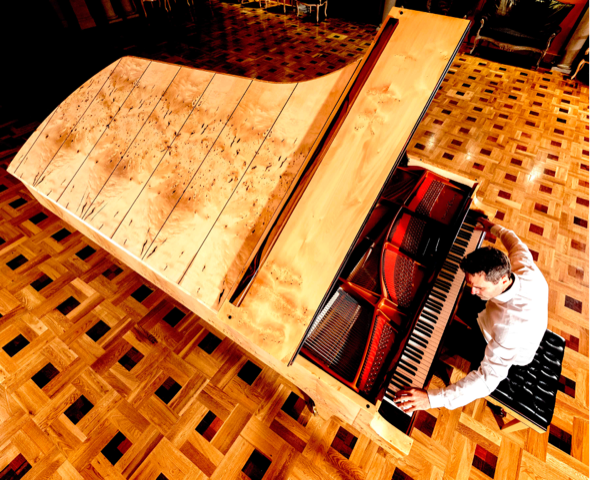World Premiere: ‘Faust’ rendered for piano and the spoken word
One of the most durable tales in Western civilization – the legend of Faust – is brilliantly rendered in a piano adaptation, performed this week by the multi-talented Australian musician of German/Slovenian parentage, Ashley Hribar.
A new recording of the music, now available digitally, will appear as a CD in the New Year. Hribar calls his recording, “Faust: A Mortal’s Tale”. It is a personal musical reflection on the Faust story, loosely based on the 1926 silent film by Wilhelm Friedrich Murnau.
The piano he chose for the recording was the Australian Big Belura by Stuart & Sons, a 108-key extended keyboard instrument that Hribar exploits to the maximum with nine additional deep bass keys and 11 more treble keys. The striking cover illustration for the CD is Hribar’s imaginative artwork. He can also claim to be a performer, composer, arranger and improviser.
 Hribar premiered the work Thursday night (Nov.26) in a live-stream of his “Faust Melodrama”, himself at the piano and narrating in German. Most of the works were from his CD “”Faust: a Mortal’s Tale” along with two arrangements of songs by Radiohead “Present Tense” and “Paranoid Android”.
Hribar premiered the work Thursday night (Nov.26) in a live-stream of his “Faust Melodrama”, himself at the piano and narrating in German. Most of the works were from his CD “”Faust: a Mortal’s Tale” along with two arrangements of songs by Radiohead “Present Tense” and “Paranoid Android”.
Of the 14 songs in the program, he arranged six of them and built his score to correspond to chapters and themes in the modern version of the tale. The outcome is a highly satisfying marriage of music and literature, beautifully played live by Hribar. Only a musician of Hribar’s caliber could connect and update the ideas in this production and personally perform it.
He dramatizes the Faust legend step by step and constructs the film in these musical terms:
Rachmaninov’s Prelude Op. 32 No. 12 represents Faust’s musings over his life accomplishments.
Georgy Catoire’s rarely heard Quatre Morceaux Op. 12 conjures up Faust’s journey into the unknown.
The Liszt Mephisto Waltz depicts the demon Mephistophelese offering Faust knowledge and earthly pleasures in exchange for his soul.
Granados’s Oriental and the De Falla Ritual Fire Dance represent the Spanish princess.
Rachmaninov returns with Etude on Dies Irae to illustrate Faust’s death.
Led Zepplin’s Stairways accompanies Faust to heaven.
Hribar’s arrangements bring uncharted piano sounds to the ear, exploiting the “color, sonority and depth” when performed on the 108-key instrument. He adapted the pieces to fit the standard 88 keys, and, he says, “This process has deepened my understanding of each work.” For the Thursday performance, he played a Steinway Boston model. The Big Belura has not yet been exported to Europe.
I asked him whether an English language version might be coming. “Absolutely!” he said. “I have done an English version but in a more improvised manner. Now I look forward to working on a refined Faustian Melodrama in English.”
The recording is available on a variety of platforms, including: Spotify, Youtube, Youtube Music, iTunes, Amazon music Deezer, Facebook Instagram, Soundcloud, Tidal, Google Play Music, Claro-Musica, emusic, Napster, Nuuday, Anghami, Gracenote, Kanjian, Pandora, Melon, iHeart Radio, 7Digital, JioSaavan, Bugs!, Awa, YG, Netease, Tencent, TikTok, and Kuack Media.
For an interview with Hribar and related commentary on the Big Belura piano, go to:
No, it’s not ‘crazy’ to want 20 more keys on your piano

This article is brought to you by the author who owns the copyright to the text.
Should you want to support the author’s creative work you can use the PayPal “Donate” button below.
Your donation is a transaction between you and the author. The proceeds go directly to the author’s PayPal account in full less PayPal’s commission.
Facts & Arts neither receives information about you, nor of your donation, nor does Facts & Arts receive a commission.
Facts & Arts does not pay the author, nor takes paid by the author, for the posting of the author's material on Facts & Arts. Facts & Arts finances its operations by selling advertising space.

